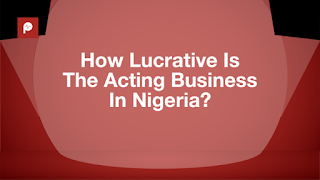This article breaks down how much money Nollywood actors make, how most actors fund an expensive lifestyle, why there is a decline in earnings, and possible solutions.
How lucrative is the Nigerian film industry? Does the popularity and quantity of films by most actors translate into material wealth?
It's often shocking when an actor, who has enjoyed years of stardom, comes out to say he is broke. Some actors either fade out of the limelight because the roles are no longer coming in, walk away from Nollywood on their own terms because the pay is no longer satisfactory, or even die because they couldn't afford their medical bills.
The poor state of their finances isn’t public knowledge until they are ailing and are in need of public financial aid from their fans, colleagues and the Actors’ Guild of Nigeria (AGN). Because of the decline in actors' fee, several Nigerian actors have relocated, and even more, are considering it.
Earlier this year, Femi Ogedengbe, who was once a 'successful' actor in the Yoruba movie industry, revealed that he currently makes more money as a security guard in the US than he did as an actor in Nigeria.
Ali Baba, commenting on Ogedengbe's decision to relocate, said that Nollywood is a make-believe world. "That’s why many who jump in get frustrated because they missed the memo: it's a huge labour of love," he wrote on Instagram.
For his role in "The Wedding Party," the highest grossing Nollywood movie ever, Ali Baba who is one of the most successful comedians in Nigeria, reportedly charged for a month on set what he charges in four hours as a comedian.
In 2017, Stanley Aguzie, an actor and producer who has appeared in series such as "Tinsel," landed a role in the hit foreign TV series, "Vikings" and "Into the Badlands" after he moved to Ireland.
While he was still working in Nigeria, the highest pay he received was N200,000 for a TV series that required him to work on set for three months. But as an actor in Ireland, it's a different story for Aguzie, who made millions of Naira for featuring in one movie.
"I made over Five Million Naira from one film. Not as a lead actor, but just as a professional actor," he told Pulse.
How much do actors really make in Nigeria?
Very few actors can still command the kind of deal that was more prevalent over a decade ago. Genevieve Nnaji, for instance, will still receive over a million naira for appearing in a Nollywood film, according to a source who spoke with Pulse. However, there are not so many producers who can afford big stars like her.
In 2014, Obi Emelonye was quoted to have said that Nnaji and Omotola Jalade-Ekeinde, two A-List actors he worked with on "The Mirror Boy" and "Last Flight to Abuja," respectively, have become too expensive as they cannot afford to charge less than their status.
He advised them to fund and star in their own productions. And in 2016, Nnaji, five years after her last lead role in the 2011 "Tango with Me," produced and starred in the film, "Road to Yesterday." And in 2017, she made her directorial debut with the anticipated star-studded comedy-drama, "Lion Heart."
Currently, most B-List actors are paid less than N400,000 per movie, and even in some cases, N200,000 per movie, a Nollywood insider tells Pulse. What they do is try to make four or five films in a month to be able to make up to N2 million. Or, they are offered N2 million to star in, at least, four films.
"There are producers paying people 50 and 100 thousand naira, which is unbelievable. But you see, those people don't care, they just want to appear in a film. A lot of the girls then get boyfriends they can collect money from, and next thing, they are producing their own film. That's why you see a lot of people, out of the blues, are producing their own film," the insider said.
Why is there a decline in actors' fees?
There are several factors that could have caused this decline, and the recession that hit Nigeria in 2016, forcing several companies to either fold, lay off staff, cut cost or take a pay cut, probably added more misery to an already bad situation.
In November 2016, the Managing Director, MultiChoice Nigeria, John Ugbe, told ThisDay Business that the entertainment company was facing tough times.
They couldn’t increase subscription rates after the devaluation of naira, despite the fact that they bought a lot of international content in dollars. However, to keep offering those content, they absorbed costs on behalf of their subscribers.
For a while, the entertainment company wasn't able to pay their bills and was supported by MultiChoice Africa.
It has been years, but quite a number of industries, individuals, businesses and investors are yet to recover from the infamous 2016 recession.
Post Top Ad
Subscribe to:
Post Comments (Atom)

















No comments:
Post a Comment